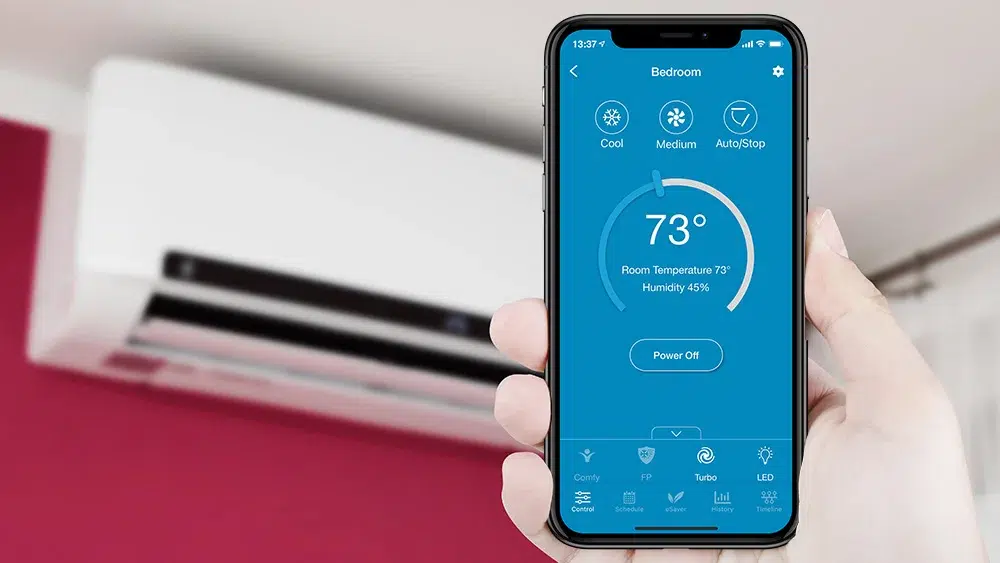As temperatures rise and technology advances, the air conditioning market has changed. Notably, smart air conditioners have emerged. These devices not only cool but also offer connectivity, automation, and control for personalised comfort. However, they have both benefits and drawbacks. This article will explore the pros and cons of smart air conditioning in Maitland.
First things first —
What Is a Smart Air Conditioner?
Control your home’s temperature remotely with a smart air conditioner. It connects to the internet via Wi-Fi or a home system. Therefore, you can adjust its settings from anywhere using just a smartphone app. This gives you full control. Many models also offer –
- Scheduling
- Geofencing
- Voice assistants like Amazon Alexa
The Pros:
1. Remote Control and Accessibility
Smart air conditioners offer easy remote control. With Wi-Fi, users adjust temperature, fan speed, and cooling mode via smartphones, even away from home. This ensures a comfortable arrival without wasting energy.
For frequent travellers or those with unpredictable schedules, this feature is especially useful. It also aids people with mobility challenges, allowing control without reaching the unit.
2. Energy Efficiency and Cost Savings
Smart air conditioners cut energy use, saving money and helping the environment. Many have features to monitor energy use, helping you adjust for savings.
Scheduling lets you set times for the AC to run, ideal for nights or when away. Geofencing turns on the AC just before you get home, saving energy. This automation ensures the AC runs only when needed, leading to significant long-term savings.
3. Customizable Comfort
Smart air conditioners offer flexible temperature settings and modes. You can usually set specific temperatures for different times via a smartphone app. Some even allow for individual room adjustments, catering to different comfort needs. This is ideal for households with varied preferences.
Additionally, some models feature sensors that monitor temperature and humidity. They automatically adjust settings for optimal comfort. This reduces the need for manual changes, ensuring a consistently comfortable home.
4. Integration with Smart Home Ecosystems
Many smart air conditioners work with home automation and voice devices. If you use Amazon Alexa, Google Assistant, or Apple HomeKit, adding a smart AC is easy. You can adjust settings and temperature with voice commands. Some models even turn off when windows or doors are open.
Tech-savvy homeowners can include smart ACs in their home systems. This boosts convenience and creates a more automated living space.
5. Enhanced Diagnostics and Maintenance Alerts
Smart air conditioners have self-diagnostics. They alert you when to clean the filter or if there’s an issue. This helps prevent bigger problems, extending the unit’s life and saving on repairs.
Getting these alerts on your phone makes it easier to keep up with maintenance. This is vital for good air quality and system efficiency. For example, a clogged filter can lower cooling, raise energy costs, and cause breakdowns.
The Cons:
1. Higher Upfront Costs
Smart air conditioners are pricier than regular ones. Their cost reflects advanced technology, connectivity, and energy efficiency. Although they reduce energy bills over time, the high upfront cost can deter budget-conscious buyers.
Homeowners should weigh long-term savings against the initial investment. The return on investment varies based on usage and local energy prices.
2. Reliance on Wi-Fi and Potential Connectivity Issues
A smart air conditioner needs a stable internet connection. If your Wi-Fi fails, you lose remote access. It then works like a regular AC, missing out on smart features.
Problems can also stem from a difficult or glitchy control app. Some users face issues with unreliable apps that need constant updates or have bugs. These problems limit functionality. So, it’s important to check the app’s quality and read reviews before buying.
3. Privacy and Security Concerns
Any internet-connected device raises privacy and security concerns. This includes smart air conditioners linked to your home Wi-Fi. Although the risk of hacking is lower than with other smart devices, it still exists.
To reduce this risk, secure your Wi-Fi with strong passwords and consider extra cybersecurity measures. Also, regularly update your device’s firmware to fix security gaps.
4. Learning Curve and Potential for Overcomplication
Smart air conditioners can be tough for non-tech-savvy people. They involve learning an app, settings, and features like scheduling and geofencing. This is hard for those used to simple remote controls.
Moreover, some might find these “smart” features unnecessary. If you just want basic cooling, the extra complexity might not be worth it. It could lead to higher costs and the hassle of learning something new. There’s also a risk of setting them up wrong, which can increase energy use.
5. Compatibility Limitations with Other Devices
Many smart air conditioners work with popular smart home systems, but not all. If you use devices from different brands, you might face compatibility issues. These can limit your AC unit’s functionality. For example, some models may work with Alexa but not with Google Assistant. Others might not fully integrate with certain home automation systems.
Is a Smart Air Conditioner Right for You?
Deciding to buy a smart air conditioner depends on your lifestyle, budget, and comfort needs. If you value convenience, want to save on energy, and have a smart home, then a smart AC is a great choice. But, if you prefer simple cooling without tech hassles, go for a traditional unit.
Weigh the pros and cons carefully. Consider your cooling needs, desired control, and if the savings and convenience justify the costs and potential tech issues.
Conclusion
Smart air conditioners provide benefits like remote control, energy savings, customizable settings, and home automation integration. However, they also have drawbacks, such as higher initial costs, dependence on the Internet, and security risks. Knowing these factors helps you decide if a smart AC is worth it.
As technology improves, smart ACs are expected to become cheaper and easier to use, potentially solving current issues. Meanwhile, assessing your needs and budget will help you pick the best air conditioning for year-round comfort.
To get smart air conditioning in Maitland, connect with Onsite Air.










